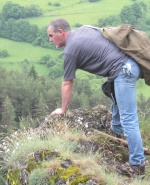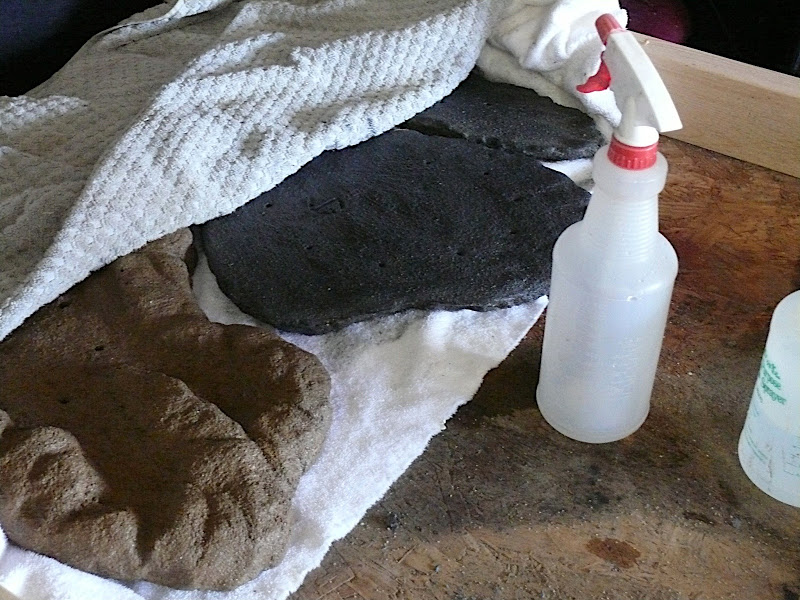Creating Planting Slabs
+4
Harleyrider
Rick Moquin
Pavel Slovák
jgeanangel
8 posters
Page 1 of 1
 Creating Planting Slabs
Creating Planting Slabs
This will hopefully be a series of videos that demonstrates how to create planting slabs from concrete. Although I have had a hand in helping create a couple of slabs previously, I have never really done it all on my own. These videos are the product of my learning in this process. I really need to thank Ken Duncan for his role...I have always looked to Ken as a mentor and teacher and he has always come through!!
John
Part 1 - (5 mins) - Overview
Part 2 - (5 mins) - Creating a flat slab
John
Part 1 - (5 mins) - Overview
Part 2 - (5 mins) - Creating a flat slab
jgeanangel- Member
 Re: Creating Planting Slabs
Re: Creating Planting Slabs
Beautifully documented and done John. I like folks who invent a better mouse trap.
Wrt Kimura's vertical stones, they are cut stones (some are natural) held together with cement.
Colin Lewis used in the past a similar technique but coming from the top.
Q: There has been some controversy wrt teh lime in the cement and adversely sweetening the soil through leaching. As you might expect this type of conversation wouldn't be much different than discussing soil recipes. What does Ken say wrt how long you wait over the curing time to use the slab, if at all? and should it be allowed to weather prior to use?
I have done a couple that have been sitting out in the yard for a couple of years now, so I'm not worried about any leaching. They were built ahead of time. One thing I did though was to drill my holes (drainage and tie in) in the concrete after it was cured with masonary bits, no problem. I had built mine flat side down and the counter had a lip.
I like yours and Ken's method of building these slabs. In your video you discussed a couple of things that you didn't like because you were casting blind so to speak (didn't see it until unmolded). I guess the way I built mine would be considered more a shallow tray than a slab (because of the lip). One advantage you have of building a slab without a mold is your ability to mold your edges prior to the cement curing and the ability to touch up in areas that you couldn't before because the top side was not visible.
You also mentioned some fine detail was lost that would need to be addressed in subsequent slabs. Have you thought of using casting sand over sand molds? It is almost the same principle but using a different support medium and a carved plug, not dissimilar to casting anything?
The aforementioned method would indeed be time consuming (carving the plug) but once the plug is carved it can be used over and over again. Of course the cement used would need to be a little more on the wetter side, or you could use leveling cement that would find its way to all the nooks and crannies without disturbing the mold.
Wrt Kimura's vertical stones, they are cut stones (some are natural) held together with cement.
Colin Lewis used in the past a similar technique but coming from the top.
Q: There has been some controversy wrt teh lime in the cement and adversely sweetening the soil through leaching. As you might expect this type of conversation wouldn't be much different than discussing soil recipes. What does Ken say wrt how long you wait over the curing time to use the slab, if at all? and should it be allowed to weather prior to use?
I have done a couple that have been sitting out in the yard for a couple of years now, so I'm not worried about any leaching. They were built ahead of time. One thing I did though was to drill my holes (drainage and tie in) in the concrete after it was cured with masonary bits, no problem. I had built mine flat side down and the counter had a lip.
I like yours and Ken's method of building these slabs. In your video you discussed a couple of things that you didn't like because you were casting blind so to speak (didn't see it until unmolded). I guess the way I built mine would be considered more a shallow tray than a slab (because of the lip). One advantage you have of building a slab without a mold is your ability to mold your edges prior to the cement curing and the ability to touch up in areas that you couldn't before because the top side was not visible.
You also mentioned some fine detail was lost that would need to be addressed in subsequent slabs. Have you thought of using casting sand over sand molds? It is almost the same principle but using a different support medium and a carved plug, not dissimilar to casting anything?
The aforementioned method would indeed be time consuming (carving the plug) but once the plug is carved it can be used over and over again. Of course the cement used would need to be a little more on the wetter side, or you could use leveling cement that would find its way to all the nooks and crannies without disturbing the mold.

Rick Moquin- Member
 Re: Creating Planting Slabs
Re: Creating Planting Slabs
As usual, John, a very interesting topic. This technique is very similar to one I used years ago to create false rocks when I was working as a landscape gardener. I just dug a rough hole in the ground and lined it with a couple of inches of cement or concrete, covered it with plastic sheeting and left it alone for a few days. When you lift the shell out and turn it over, voila! instant rock. And a damn sight lighter, too!

Harleyrider- Member
 Re: Creating Planting Slabs
Re: Creating Planting Slabs
Thanks Pavel!
Rick...as to your question about the ph issues...the thing I didn't say that I will be mentioning in a future video is that Ken uses a sealer once the slab is completely cured. That should eliminate/minimize the potential chemical interactions.
In future videos, I will also be covering some detailing techniques including the use of acrylic paints on more elaborate creations. Sealing will be part of that conversation.
Harley Man:) - I have seen a few landscape creations like you mention. Even saw some very realistic fiberglass rocks recently that were formed from natural stone casts.
John
Rick...as to your question about the ph issues...the thing I didn't say that I will be mentioning in a future video is that Ken uses a sealer once the slab is completely cured. That should eliminate/minimize the potential chemical interactions.
In future videos, I will also be covering some detailing techniques including the use of acrylic paints on more elaborate creations. Sealing will be part of that conversation.
Harley Man:) - I have seen a few landscape creations like you mention. Even saw some very realistic fiberglass rocks recently that were formed from natural stone casts.
John
jgeanangel- Member
 Re: Creating Planting Slabs
Re: Creating Planting Slabs
Hi John, thanks for the videos. Those will help me a lot to try it out by myself.
Just a question: How long do you have to dry it? And do you have to wet the slabs in the drying process so they don't crack?
Just a question: How long do you have to dry it? And do you have to wet the slabs in the drying process so they don't crack?

Nik Rozman- Member
 Re: Creating Planting Slabs
Re: Creating Planting Slabs
Hey Nik... I am glad you find the videos helpful. My understanding is that it can take as long as 28 days for concrete to completely cure. I have used spray bottles and towels to help keep mine moist through the curing process. I spray the slabs, top and bottom, and the towels at least twice a day. I would love to understand more about the curing process and what techniques will result in the best product.

John
John
jgeanangel- Member
 Re: Creating Planting Slabs
Re: Creating Planting Slabs
Technically concrete will never be completely cured but by the time you hit 28 days it has achieved the majority of its strength.
I don't remember off the top of my head exactly what the chemical reaction is durring curing but the water will dissolve the cementitious elements which then crystalize, interlocking with each other.
Some tips I remember from my coursework is that you'll have the greatest strength by using the least amount of water. I don't remember which butpotash fly-ash(?) is a pretty good additive for either helping with fluidity or increasing strength.
If I can find my texts I can check and see which exactly that is and maybe find some of the other tips that might be of help.
I don't remember off the top of my head exactly what the chemical reaction is durring curing but the water will dissolve the cementitious elements which then crystalize, interlocking with each other.
Some tips I remember from my coursework is that you'll have the greatest strength by using the least amount of water. I don't remember which but
If I can find my texts I can check and see which exactly that is and maybe find some of the other tips that might be of help.
Last edited by jon hultgren on Wed Jan 13, 2010 4:31 am; edited 1 time in total (Reason for editing : doubting my memory)

jon hultgren- Member
 Re: Creating Planting Slabs
Re: Creating Planting Slabs
This site describes some of the principles involved...
http://matse1.mse.uiuc.edu/concrete/prin.html
http://matse1.mse.uiuc.edu/concrete/prin.html

John Quinn- Member
 Re: Creating Planting Slabs
Re: Creating Planting Slabs
Hi Jon,
thanks for the time and energy you put into these videos... a great learning tool. Both for you but especially for us
thanks for the time and energy you put into these videos... a great learning tool. Both for you but especially for us
Guest- Guest
 Here is a better look at the slabs...
Here is a better look at the slabs...
Thanks Jon, John, and Tony!!!
I wasn't happy with how well you could see the slabs in the first two videos so I put together this short video...it also contains a little more elaborate slab that I have also recently worked on. I just wanted to restate that this is a learning experience and I see much room for improvement:)
I wasn't happy with how well you could see the slabs in the first two videos so I put together this short video...it also contains a little more elaborate slab that I have also recently worked on. I just wanted to restate that this is a learning experience and I see much room for improvement:)
jgeanangel- Member
 Re: Creating Planting Slabs
Re: Creating Planting Slabs
Thanks for the very informative videos John.
Jon is spot on with his assertion that concrete does continue to strengthen throughout its life. That's one fact that I recall from my early training in building construction. I did 5 years training, before I left the architects office for a new career in teaching, 35 years ago.
I did some slab and pot construction using a mix of high alumina cement (ciment) and portland cement a few years ago. This has the added advantage of very rapid setting times, allowing for much faster construction of multiple layered structures with good texture. It requires care and experience to do well, but is worth the effort of learning.
Colin Lewis used to have a tutorial on this at his site, but I can't find it now. I'll see if I can dig out notes and photo's of mine.
Jon is spot on with his assertion that concrete does continue to strengthen throughout its life. That's one fact that I recall from my early training in building construction. I did 5 years training, before I left the architects office for a new career in teaching, 35 years ago.
I did some slab and pot construction using a mix of high alumina cement (ciment) and portland cement a few years ago. This has the added advantage of very rapid setting times, allowing for much faster construction of multiple layered structures with good texture. It requires care and experience to do well, but is worth the effort of learning.
Colin Lewis used to have a tutorial on this at his site, but I can't find it now. I'll see if I can dig out notes and photo's of mine.

Kev Bailey- Admin
 Similar topics
Similar topics» General areas good to collect slabs and planting stones in USA
» Creating a Rock Planting Video Tutorial
» clay use for slabs
» Buying Penjing Pots/Slabs
» Cement Slabs
» Creating a Rock Planting Video Tutorial
» clay use for slabs
» Buying Penjing Pots/Slabs
» Cement Slabs
Page 1 of 1
Permissions in this forum:
You cannot reply to topics in this forum|
|
|








